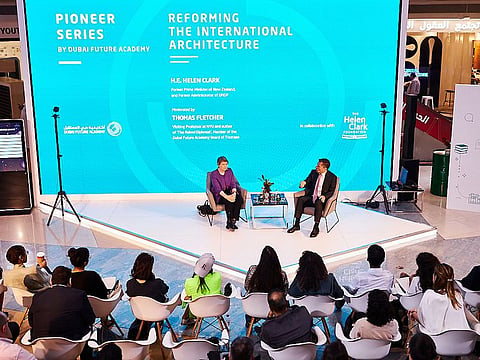Call to check spread of harmful content on social media
Formner New Zealand PM Helen Clark says wider regulatory approach is essential

Dubai Helen Clark, former Prime Minister of New Zealand, former Administrator of the United Nations Development Programme (UNDP) and patron of The Helen Clark Foundation (THCF), on Wednesday called for a curb on the spread of harmful content on social media.
She was speaking during the Dubai Future Week, being organised by Dubai Future Foundation at Jumeirah Emirates Towers.
Looking at the numbers, Clark noted that with more than 2.2 billion active users each month, Facebook currently ranks as the world’s largest social media platform, followed closely by YouTube with 1.9 billion users. In 2018, more than 300 hours of video were uploaded to YouTube every minute, and 500 million tweets were sent on Twitter every day. Clark highlighted the need to address the gap between the scale of online content being generated and the capacity of social media platforms to monitor it effectively.
She also made a call to action for governments around the world
Clark explained that while implementing systems to detect harmful content online are essential, a wider regulatory approach is imperative to contain its spread. She continued with a call to action for social media companies to prioritise investment in developing more advanced technical solutions that can help resolve this issue. while social media has the power to bring about positive changes in society, it can also be used to promote hate and violence. As it stands, Facebook and YouTube are working on upgrading their automated systems and have hired tens of thousands of people around the world to assist with content moderation.
Regulating and moderating hateful content on social media clearly poses a challenge. Governments and social media companies need to work together to identify effective solutions. With the rise of harmful content online and its potential impact on the public interest, governments of several countries have adopted an interventionist approach through introducing legislation or regulations with strict deadlines and high penalties for non-compliance in order to oblige social media platforms to rapidly remove such posts.
Clark also expressed optimism that companies will pay more attention to curbing the spread of negativity online – in New Zealand and the rest of the world.

